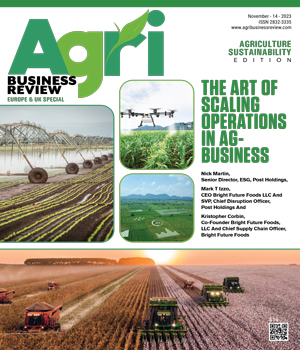According to the United Nations Food and Agriculture Organization (UN FAO), one-third of the food produced for human consumption globally is wasted.
This alarming statistic necessitates collective action from global stakeholders to enhance food security and mitigate environmental repercussions. Preventing food losses and waste can profoundly benefit the balance of supply and demand, ultimately improving resilience and profitability across various F&B value chains.
Catalysing this paradigm shift towards sustainable food practices is De La Tierra, a pioneering organisation dedicated to reducing food loss and waste and promoting responsible consumption.
 Its core activities revolve around three key pillars—agri-food consulting, fresh produce and ingredients trade, and post-harvest technologies to reduce food loss and valorise by-products. These offerings collectively offer a strategic pathway to harmonise food supply and demand, fortify food security, and alleviate environmental impacts, all while fostering economic gains.
Its core activities revolve around three key pillars—agri-food consulting, fresh produce and ingredients trade, and post-harvest technologies to reduce food loss and valorise by-products. These offerings collectively offer a strategic pathway to harmonise food supply and demand, fortify food security, and alleviate environmental impacts, all while fostering economic gains.
“When it comes to post-harvest losses, we bring a wealth of expertise spanning polymer science, post-harvest management, and crop physiology that serves as a bridge to crafting sustainable solutions that are not just innovative but remarkably effective,” says Athanasios Mandis, founder and director of De La Tierra.
Addressing Sustainability Dilemmas with a Holistic Approach
In the agri-food sector, organisations, whether large or small, grapple with sustainable practices. SMEs face obstacles in comprehending and implementing eco-conscious procedures, while larger organisations struggle to formulate practices and communicate them meaningfully to stakeholders and the wider public.
Mitigating these challenges, De La Tierra's consultancy services address critical governance deficits and optimise efforts for firms of all sizes. Through an exhaustive assessment of existing regulatory compliance strategies and their alignment with industry standards, the company helps clients better understand their current standing in the complex landscape of sustainability and governance.
These consultancy services are backed by De La Tierra’s trade competencies, which connect businesses with extensive networks and market opportunities. This strategic bridge steers entities towards a common goal of building a future where agri-food practices harmonise with environmental stewardship, economic growth, and community welfare.
The ability to uncover connections and genuinely listen to the needs of farming communities, combined with lived experiences and local knowledge, lies at the heart of De La Tierra’s success.
Transforming Post-Harvest Management and By-Product Valorisation
De La Tierra confronts a significant issue highlighted by the UN FAO, which states that 31 percent of produced food is lost post-harvest. Based on the studies, factors like inadequate infrastructure, poor handling practices, and market access issues result in a $990 billion economic setback while leaving a significant carbon and water footprint.
Recognising the criticality of mitigating post-harvest losses, De La Tierra strategically partnered with Post Harvest Solutions, the developer of 'ZoePac.' Through the collaboration, it offers clients a range of modified atmosphere packaging that enhances product shelf life, allowing storage and transport of goods over longer distances without compromising quality or condition.
Traditional agri-food practices often focus on the core product and market, relegating by-products to lower-value applications such as compost or animal feed. However, within these agricultural by-products lie molecules with highly functional properties that De La Tierra aims to recover through its partnership with agricultural by-product valorisation specialist Labiocrac. This synergy ensures that no part of the harvested crop is wasted, driving economic efficiency and reducing resource depletion.
 Democratising Risk Mitigation through Qualitative Stakeholder Engagement
Democratising Risk Mitigation through Qualitative Stakeholder Engagement
As De La Tierra takes strides in transforming post-harvest management, its commitment to sustainability extends to broader initiatives. The current ESG reporting landscape is marked by the proliferation of disclosure standards, each catering to different stakeholder demands. In light of this, its future vision involves introducing a modular software solution to meet various metrics and mandates, enabling SMEs to optimise their processes with a white-label solution that democratises risk mitigation through qualitative stakeholder engagement.
Delving into its wide-ranging benefits, Mandis draws a compelling parallel between the organisation and Claude Debussy’s words, “It is in the spaces between the notes that the true essence of music lies.” With this analogy, he encapsulates how his company acts as a bridge between the silos that hinder F&B businesses from establishing sustainable practices, reinforcing its value as a reliable agri-food innovation partner.
This alarming statistic necessitates collective action from global stakeholders to enhance food security and mitigate environmental repercussions. Preventing food losses and waste can profoundly benefit the balance of supply and demand, ultimately improving resilience and profitability across various F&B value chains.
Catalysing this paradigm shift towards sustainable food practices is De La Tierra, a pioneering organisation dedicated to reducing food loss and waste and promoting responsible consumption.
 Its core activities revolve around three key pillars—agri-food consulting, fresh produce and ingredients trade, and post-harvest technologies to reduce food loss and valorise by-products. These offerings collectively offer a strategic pathway to harmonise food supply and demand, fortify food security, and alleviate environmental impacts, all while fostering economic gains.
Its core activities revolve around three key pillars—agri-food consulting, fresh produce and ingredients trade, and post-harvest technologies to reduce food loss and valorise by-products. These offerings collectively offer a strategic pathway to harmonise food supply and demand, fortify food security, and alleviate environmental impacts, all while fostering economic gains. “When it comes to post-harvest losses, we bring a wealth of expertise spanning polymer science, post-harvest management, and crop physiology that serves as a bridge to crafting sustainable solutions that are not just innovative but remarkably effective,” says Athanasios Mandis, founder and director of De La Tierra.
Addressing Sustainability Dilemmas with a Holistic Approach
In the agri-food sector, organisations, whether large or small, grapple with sustainable practices. SMEs face obstacles in comprehending and implementing eco-conscious procedures, while larger organisations struggle to formulate practices and communicate them meaningfully to stakeholders and the wider public.
Mitigating these challenges, De La Tierra's consultancy services address critical governance deficits and optimise efforts for firms of all sizes. Through an exhaustive assessment of existing regulatory compliance strategies and their alignment with industry standards, the company helps clients better understand their current standing in the complex landscape of sustainability and governance.
These consultancy services are backed by De La Tierra’s trade competencies, which connect businesses with extensive networks and market opportunities. This strategic bridge steers entities towards a common goal of building a future where agri-food practices harmonise with environmental stewardship, economic growth, and community welfare.
When it comes to reducing post-harvest losses, we bring a wealth of expertise spanning polymer science, post-harvest management, and crop physiology that serves as a bridge to crafting sustainable solutions that are not just innovative but remarkably effective
Transforming Post-Harvest Management and By-Product Valorisation
De La Tierra confronts a significant issue highlighted by the UN FAO, which states that 31 percent of produced food is lost post-harvest. Based on the studies, factors like inadequate infrastructure, poor handling practices, and market access issues result in a $990 billion economic setback while leaving a significant carbon and water footprint.
Recognising the criticality of mitigating post-harvest losses, De La Tierra strategically partnered with Post Harvest Solutions, the developer of 'ZoePac.' Through the collaboration, it offers clients a range of modified atmosphere packaging that enhances product shelf life, allowing storage and transport of goods over longer distances without compromising quality or condition.
Traditional agri-food practices often focus on the core product and market, relegating by-products to lower-value applications such as compost or animal feed. However, within these agricultural by-products lie molecules with highly functional properties that De La Tierra aims to recover through its partnership with agricultural by-product valorisation specialist Labiocrac. This synergy ensures that no part of the harvested crop is wasted, driving economic efficiency and reducing resource depletion.
 Democratising Risk Mitigation through Qualitative Stakeholder Engagement
Democratising Risk Mitigation through Qualitative Stakeholder Engagement As De La Tierra takes strides in transforming post-harvest management, its commitment to sustainability extends to broader initiatives. The current ESG reporting landscape is marked by the proliferation of disclosure standards, each catering to different stakeholder demands. In light of this, its future vision involves introducing a modular software solution to meet various metrics and mandates, enabling SMEs to optimise their processes with a white-label solution that democratises risk mitigation through qualitative stakeholder engagement.
Delving into its wide-ranging benefits, Mandis draws a compelling parallel between the organisation and Claude Debussy’s words, “It is in the spaces between the notes that the true essence of music lies.” With this analogy, he encapsulates how his company acts as a bridge between the silos that hinder F&B businesses from establishing sustainable practices, reinforcing its value as a reliable agri-food innovation partner.
Thank you for Subscribing to Agri Business Review Weekly Brief



